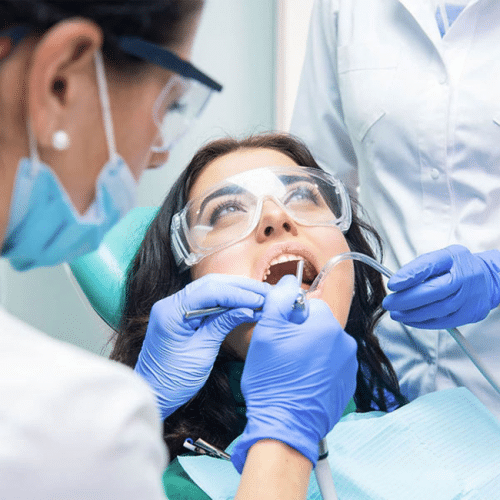Do I Have Dental Erosion?
Dental Erosion is when tooth enamel is lost due to acid attack. Enamel is a hard, protective layer over your tooth that protects against sensitivity from the dentine beneath it. If dentine becomes exposed this can lead to pain and sensitivity.
Why is tooth enamel important?
Enamel protects teeth from chewing, biting, crunching and grinding. However, enamel can chip and crack. Enamel protects teeth from painful temperatures which would cause sensitivity.
What causes enamel erosion?
Tooth erosion can happen when acids wear away enamel on teeth. Enamel can be caused by the following:
- Esxcessive soft drinks, fruit drinks and sports drinks(even sugar-free varieties)
- Dry mouth or low salivary flow(xerostomia)
- A diet which is high is sugar and starches
- Acid reflux disease
- Gastrointestinal problems
- Medications such as antihistamines and aspirin
- Inherited dental conditions with weakened enamel and dentine
- Environmental factor such as friction, wear and tear, stress and corrosion
What are the environmental cuases of dental erosion?
Friction, wear and tear, stress and corrosion can cause erosion of your tooth surface. Clinical terms used to explain the mechanisms are:
- Attrition: This is natural tooth-to-tooth friction that happens after clenching or grinding such as bruxism which can occur involuntarily during sleep
- Abrasion: This is physical wear and tear of the tooth surface that happens with brushing teeth too hard, improper flossing, biting on hard objects(such as fingernails, bottle caps or pens) or chewing tobacco
- Abfraction: This happens after stress fractures in the tooth such as cracks from flexing or bending of the tooth
- Corrosion: This occurs chemically when acidic content hits the tooth surface such as with certain medications like aspirin or vitamin C tablets, highly acidic foods, frequent vomiting(bulimia) or alcoholism
What does dental erosion look like?
Dental erosion causes your enamel to wear away revealing yellow darker dentine beneath it. Your dental fillings may become more noticeable if the nearby tooth is dissolving away due to acid erosion.
Can my tooth erosion be reversed?
Tooth decay cannot be stopped or reversed. Enamel can repair itself by using minerals in salvia and fluoride from toothpaste. However, if the tooth decay process continues then more minerals are lost. With the passage of time, the enamel is weakened and destroyed forming a cavity.
Can tooth enamel be repaired or restored?
Once enamel is damaged it cannot be brought back however weakened enamel can be restored by increasing it’s mineral content. Toothpastes and mouthwashes will never rebuild enamel but they can help the remineralisation process. Your dentist at Smile Hub has proven recommended and long-lasting techniques for restoring damaged tooth enamel and helping ensure your tooth remains strong for eating.
How can I treat my dental erosion?
Drink plenty of water while eating and rinse the mouth with water following acidic drinks or foods. Saliva helps buffer and remove acids so sugar-free chewing gum protects teeth from erosion by enhancing the saliva flow.





















